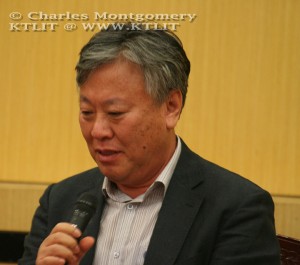I’ve written about Kim Sakkat elsewhere as Yi Munyol’s excellent fictional character in his book The Poet (available on Amazon for nearly nothing – so why don’t you just head over there and buy it? I’ll wait). But as I’m still sorting through Humour in Korean Literature in some search for why and where Korean literary humour is and isn’t, I have come across a brilliant example of his literary/poetic wit from the essay Kim Sakkat: The Popular Humorist by Richard Rutt.
One of the things Sakkat had to do was ‘sing for his dinner.’ He traveled the countryside trading verses for lodging and food. As poetry competition was a feature of his era, his skill was recognized and rewarded when he did well.
One kind of poetic competition or contest was to be given a set of words, in order, and then to have to use them in a poem. In one case he was challenged to write a poem with the first line ending in myok, a relatively obscure character (this was at the time that all literature was in Chinese characters) meaning “to seek and find.” Then, the challenge continued, all four lines needed to end in this character.
This is a bit of a problem, since the poem couldn’t be redundant – that is to say the character must be used differently in each case. Kim responded brilliantly.
Of all the possible rhymes how did you find myok?
The first was hard enough to find, much more the second myok.
If a night’s lodging depends on this myok,
Maybe a rustic schoolmaster knows nothing else but myok?
This is a brilliant takedown, and if you don’t understand it all immediately, go back and put the formal meaning of myok in where it fits, and the actual word myok in where it fits.
Then you get this:
Of all the possible rhymes how did you find (the word) myok?
The first was hard enough to find, much more the second to seek and find .
If a night’s lodging depends on this seeking and finding,
Maybe a rustic schoolmaster knows nothing else but (seeking and finding OR the word itself) myok?
This is dumfoundead (a more modern kyopo poet) level ass-kicking (I use this as a literary term) in rhyme.
The rest of this essay is full of even better examples of Sakkat’s skill, some so scatological that Rutt (which now sounds dirty to me) is forced to render them in Latin.
Brilliant stuff. Anyone in Seoul can come to a discussion of Yi Munyol’s take on Kim Sakkat, The Poet at the Seorae Community Center: 2012 March 19 (Monday), from 13:30 to 15:30.The presenter is Korean writer Ahjin Shim, though the presentation is in English.
Rutt’s article is from:
Humour In Korean Literature
Chun Shin-yong, Editor
International Cultural Foundation
Si-sa-yong-o-sa Publishers
Seoul Korea



